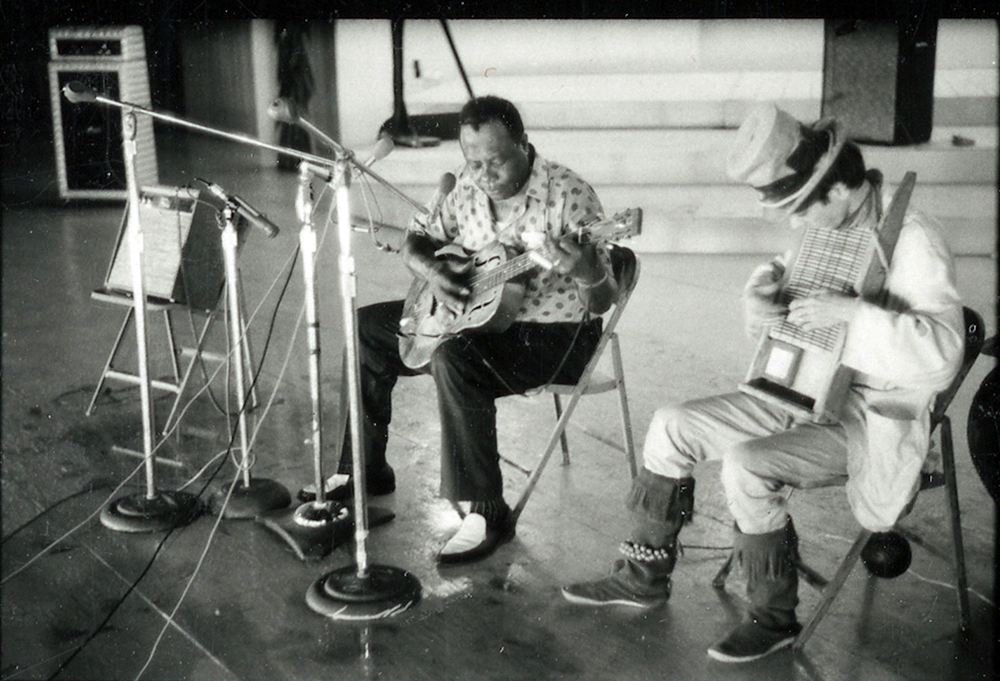I felt like it was like the zombie film that wouldn’t die.” So says Augusta Palmer, filmmaker and associate professor of communication arts at St. Francis College in Brooklyn, about her latest movie, The Blues Society, enjoying its world premiere at the Indie Memphis Film Festival this coming Sunday. But the producer/director isn’t talking about any scary on-screen content; her “zombie” comment refers to the film’s half-genesis nearly 10 years ago, and the way it insisted on being made despite Palmer’s other commitments.
She had compelling personal reasons to see it through: Her father was the late musician and writer Robert Palmer, who helped found the Memphis Country Blues Society in the mid-’60s. Her mother Mary Branton was also deeply involved in the blues festivals that the society staged at the Overton Park Shell from 1966-1969. A decade ago, Augusta Palmer saw footage from the final year of those concerts — shot by Adelphi Records owner Gene Rosenthal — and it resonated deeply with her.
“Gene played me a segment of my mom speaking at the festival when she was pregnant with me in 1969. So I was pretty much hooked, but it seemed really difficult to figure out the rights and everything, so I just sort of let it go. A few years later I thought, ‘Well, no. I am interested in this, but I want to tell the whole story, from ’66 to ’69.’”
The festivals and their backstory were rich subject matter indeed, marking a turning point in the history of Memphis and the blues, eminently worth telling in full. When Fat Possum Records bought Rosenthal’s 1969 footage and tasked directors Joe and Lisa LaMattina to edit it down to a feature-length film, Memphis ’69, there was still much left to explore. While that film drops the viewer directly into the experience of a single weekend, Palmer wanted to situate the entire four-year run of festivals within the context of the blues devotees who initiated them, a coterie of artists, musicians, and beatniks (or proto-hippies) who comprised the Memphis Country Blues Society and its supporters. “I was very interested in the whole trajectory of it,” she says.
And so the film roared back to life, lurching in fits and starts as Palmer assembled footage and interviews from sprawling and diverse sources. It helped that some of those involved were film buffs and loved shooting casual, oddball footage of themselves and their friends. Today, their LSD-fueled hijinks live on in the glorious black and white scenes that Palmer uses to set the stage for the festivals-in-the-making, though she found a little of that went a long way.
“The footage of crazy artists in Memphis was shot by an experimental filmmaker named Carl Orr who was part of John McIntire’s Beatnik Manor scene,” Palmer says. “There’s actually a ton more of that stuff. But when I was able to get some of that, at first I felt like I’d sprayed my film with patchouli and I couldn’t breathe! So I dialed it back a little bit. But that stuff really captured the spirit of the time so beautifully.”
So too does the archival footage of great Memphis blues artists that Palmer uses to establish the importance of the blues to Memphis, even as it was ignored by the city’s racist establishment. That historical context underscores why it was down to the beatnik misfits to celebrate the innovations of the Black men and women in their midst, rendered invisible by the mainstream. And, as the engrossing festival performance scenes of Furry Lewis, Bukka White, and others reveal, their exquisite artistry very much deserved celebration.
Yet Palmer also complicates the beatniks’ utopian motivations with some well-considered comments from scholars and writers like Zandria Robinson and Jamey Hatley, who insist on a more critical perspective. Robinson notes that, in presenting poor, often rural Black artists, the white festival organizers had an attitude of “let’s be friends in spite of power dynamics!” Palmer leans into that critique unflinchingly, perhaps best expressed by Furry Lewis’ white protégé, the late Zeke Johnson. “Some of it was paternalistic,” Johnson reflects, “and we didn’t even realize it at the time.”
The Blues Society screens at Playhouse on the Square on Sunday, October 29th, 3 p.m. An after-party will be held at the 1884 Lounge at 5 p.m. that day, featuring The Wilkins Sisters and Sharde Thomas and the Rising Stars Fife and Drum Band. Visit indiememphis.org for more information.
